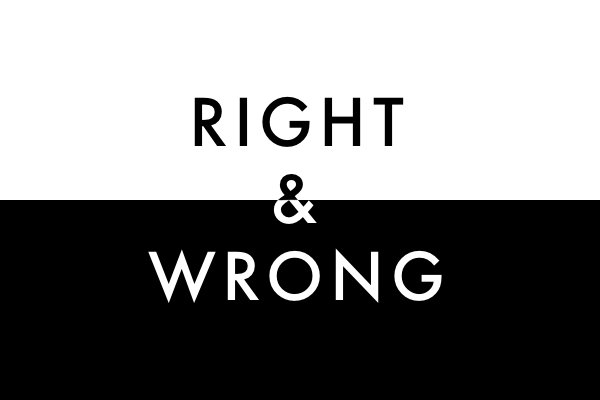I am finding out that to be ‘ethical’ is not as cut and dry as I once thought it was. Prior to conducting my in depth research on the subject, I used to think it was easy to determine right from wrong. However, I am quickly finding out that there are varying degrees of right and wrong. What does this mean?
It means, that I for one was a person that may have been too quick to judge. One’s perception of what is right and wrong varies significantly based on a number of factors including but not limited to: culture, social position, values, organizational culture, religion, etc. Religion is probably the single greatest culprit when imposing what is right and wrong, but I am not going to get into a religious debate. Nor will I preach. When it comes to religion, everyone has their own beliefs and views and I respect that. I find that attempting to engage in constructive conversation about religion never goes well. There is too much passion, and passion clouds judgement and tempers tend to flare.
Today, I want to talk to give you an example of how varying cultures has changed my perspective on what is ethical? Or what is right and what is wrong? Apple was recently embroiled in a controversy whereby they were accused of sourcing rare earth materials from suppliers that engage in child labour. Now for most, including myself, the outrage was immediate.
How could they?! What irresponsibility! Shame on them! Boycott!
You know, the usual knee-jerk reactions.
However, what if I told you, that Apple had a [comprehensive audit program] (http://www.apple.com/supplier-responsibility/labor-and-human-rights/) that specifically looked at child labour practices. What if I told you that if one of Apple’s suppliers were found to have engaged in Child Labour practices, they forced the supplier to return the child home, pay for their education at a school of the parent’s choice AND continue to provide basic income needs for the child’s family until they reach legal working age? Would you immediately call for a boycott of Apple products? Or would you recognize the good that they have done in these developing nations.
On the flip side, what if I told you that the child was working because his parents were both incapable of working and the income the child earned was the family’s sole source of income? Whether or not the child worked determined if the family would eat or not? Would you look differently upon the supplier who provided the child with a job and subsequently an income to support his family? What if it was the norm within that family’s culture for children to work? Sure, first world societies are quick to point out the ethical ramifications of child labour, but we can’t presume that these families are as equally educated.
As you can see, it is not black and white. Many of you will have varying opinions on the subject and I for one am not giving mine either way. However, instead of jumping on the bandwagon and targeting companies such as Apple for ethical wrongdoings, we all need to take a step back and look at the whole picture. I for one will not presume that my version of right and wrong is equal to another’s. I have to respect that others have varying opinions and in my mind, the greatest weapon against ethical transgressions is education.
Do me a favour, next time you are faced with an ethical situation, or someone you know does something ridiculous from your point a view....take a step back and try and understand the whole picture. Understand the root cause of the situation. Don’t be quick to blame. If anything, try and offer a solution to the root cause. In my mind, that would be the most constructive way of dealing with right and wrong.
Hope you enjoyed. Please upvote and follow!

